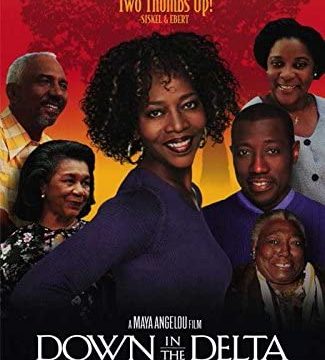Doug’s Cinematic Firsties is a recurring series wherein Douglas Laman (A.K.A. NerdInTheBasement) will review a well-known classic motion picture that he’s never seen before.
Down in the Delta focuses on a family living in Chicago plagued by turmoil. Loretta Sinclair (Alfre Woodard) struggles to secure a job to take care of her two kids while Loretta’s mom, Rosa Sinclair (Mary Alice), is forced to take care of the family. Something’s gotta change. Rosa, after talking to some of their relatives on a phone call, comes up with an idea. Perhaps a return to the family’s root in Mississippi will turn things in Loretta’s life around. Loretta and her two kids aren’t exactly enthusiastic about the idea of leaving their familiar surroundings for an extended stay at Uncle Earl’s (Al Freeman Jr.) house. But the last thing Loretta’s family wanted could end up being just the thing they needed.
The first word that comes to mind when thinking about Myron Goble’s screenplay for Down in the Delta is “pleasant”. This is a thoroughly amiable movie with an upbeat tone, a light touch and a narrative that delivers the good when it comes to feel-good entertainment. It’s easy to see this Maya Angelou directorial effort being something that could have worked like gangbusters as counterprogramming against blockbusters in the summertime ala The Way Way Back or Moonrise Kingdom. I bring up this quality not to diminish Down in the Delta’s accomplishments by labeling it as not “deep enough” to be considered a good movie.
Rather, I found its laidback hopeful ambiance to be a nice counterbalance to so much of the misery in the COVID-19 world. Down in the Delta is the good kind of comfort cinema that reminds you that it’s ok for movies to just be heartwarming and uplifting. Plus, Delta tells its moving story with a collection of strong performances. Best of these turns is Alfre Woodard as Loretta. Woodard can always be counted on to deliver something memorable in her on-screen work and her performance in Down in the Delta is no exception. Woodard’s depiction of Loretta’s gradual growth over the course of Down in the Delta is truly remarkable and helps to make sure Loretta’s arc lands as powerfully as it does.
In addition to an assortment of memorable performances, Down in the Delta also serves up some quietly groundbreaking elements in its story, particularly in regards to the character of Loretta’s young daughter, Tracy (Kulani Hassen). Midway through Down in the Delta, Loretta explicitly refers to Tracy as being autistic. Up to that point, I had a hunch, being autistic myself, that Tracy was exhibiting traits associated with autism. To hear the character diagnosed as that, though, that alone was shocking. So many movies depict characters with traits of autism without ever labeling them as autistic. Down in the Delta is a story riddled with wonderful specific details regarding the family history of the Sinclair’s. It’s truly incredible they took that specific-heavy approach to the character of Tracy as well.
That’s not the only way Tracy, as a character, breaks down barriers for autistic characters on-screen. Most notably, I think Tracy is the only autistic woman of color I’ve ever seen in a feature film? God, that’s so sad to consider, but thank God Tracy at least exists to fight that erasure. But the best part about Tracy’s presence in Down in the Delta is something that resonated with me on a profoundly personal level. I’m talking about when Tracy finally speaks her first words (“Bye-bye!”) to her Mom after previously only speaking in screams or silence. Up to this point, Loretta has basically resigned herself to the idea that Tracy will never speak.
Then that “Bye-bye!” is heard and everything changes. Seeing Loretta react to her child finally speaking, in that instance, I got a glimpse at what it must have been like for my parents to hear my first words. I didn’t talk until I was three years old, like Loretta, my parents were worried their autistic child wouldn’t ever speak. Watching Loretta’s mixture of excitement, joy and tears at hearing Tracy speak, I was reminded of what it must have been like for my own Mom and Dad to hear me talk for the first time. That’s not an experience I ever thought would be reflected in a movie but I’m so grateful to director Maya Angelou for rendering it in a motion picture. That moment with Tracy is one of many ways Down in the Delta’s hopeful feel-good tale delivers stealthily powerful storytelling.

